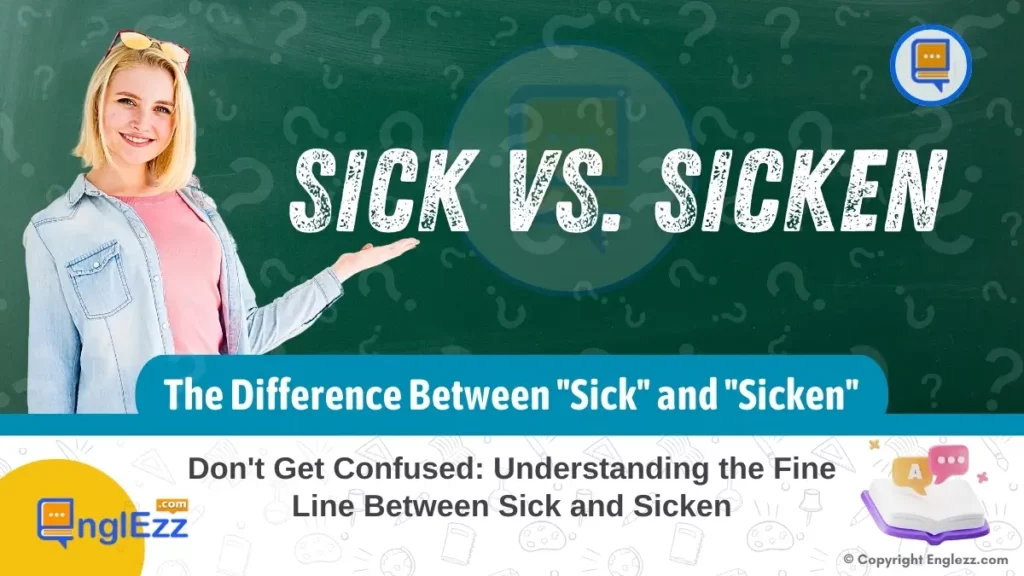Welcome to our ELT (English Language Teaching) blog! Today, we’re going to explore the nuances between two commonly confused words: “sick” and “sicken.” These words may seem similar at first glance, but they have distinct meanings and uses. By the end of this post, you will be able to confidently use both words correctly in various contexts. Discover the key differences between sick and sicken in English. Enhance your language skills with this insightful guide.

Table of Contents
What Does Sick Mean?
“Sick” is an adjective that describes a state of illness or discomfort. When someone is “sick,” they are experiencing symptoms that indicate poor health, such as a fever, nausea, or fatigue. “Sick” can also be used to describe a general feeling of being unwell, both physically and emotionally.
Examples:
- Physical Illness: “I can’t come to work today because I’m sick.”
- Emotional Distress: “She felt sick with worry after hearing the news.”
- Colloquial Use: “That movie was sick!” (Note: In this context, “sick” is slang for something impressive or amazing, commonly used in informal speech.)
What Does Sicken Mean?
“Sicken” is a verb that means to make someone feel sick or to cause disgust. It can describe both physical and emotional reactions. When something “sickens” you, it brings about a strong negative response, often related to revulsion or profound disapproval.
Examples:
- Causing Physical Illness: “The spoiled food sickened everyone at the picnic.”
- Causing Disgust: “The sight of the crime scene sickened the investigators.”
- Figurative Use: “The thought of such injustice sickens me.”
Key Differences Between Sick and Sicken in English
Part of Speech:
“Sick” is an adjective.
“Sicken” is a verb.
Usage:
Sick is a state of being, while sicken is an action that causes someone to feel sick.
Sick typically implies a more general or chronic condition, while sicken implies a more immediate or intense reaction.
Sick is often used to describe a person’s physical or mental health, while sicken is used to describe a reaction to something that causes disgust or revulsion.
In summary, sick refers to a state of being unwell, while sicken means to make someone feel sick or disgusted. Understanding the difference between these two words can help you communicate more effectively and accurately in your writing and speech.
Context:
- “Sick” is used to express someone’s condition (e.g., feeling unwell).
- “Sicken” is used to express an action that induces illness or disgust.
Tips for Using Sick and Sicken Correctly
Identify the Subject’s State: If you are describing how someone feels, use “sick.” For example, “He is sick with the flu.”
Identify the Cause: If you are describing what causes someone to feel unwell or disgusted, use “sicken.” For example, “The graphic images sicken me.”
Since “sick” is an adjective, it will typically follow a form of the verb “to be” (e.g., “am,” “is,” “are”). Since “sicken” is a verb, it will be used in active or passive forms (e.g., “The news sickened him” or “He was sickened by the news”).
Practice Exercises
Let’s put this knowledge into practice with a few exercises. Choose the correct word (“sick” or “sicken”) to complete each sentence.
- The thought of eating raw fish _ me.
- After playing in the rain, she got .
- He was by the corrupt practices he witnessed.
- Many people feel _ during long car rides.
Answers:
- sickens
- sick
- sickened
- sick
By understanding and practicing the differences between “sick” and “sicken,” you can enhance your English proficiency and communicate more precisely. Keep an eye on this blog for more language tips and lessons!
Happy learning!









🔍 Check out this insightful guide on Understanding The Differences Between “Sick” and “Sicken” in English at EnglEzz
to enhance your language skills! 📚💬 Don’t miss out! Follow and like for more valuable content!
.
https://www.englezz.com/differences-between-sick-and-sicken-in-english
.
#englezz #learnenglish #englishlanguage #languagelearning #englishgrammar #vocab #grammarlessons #languageguide